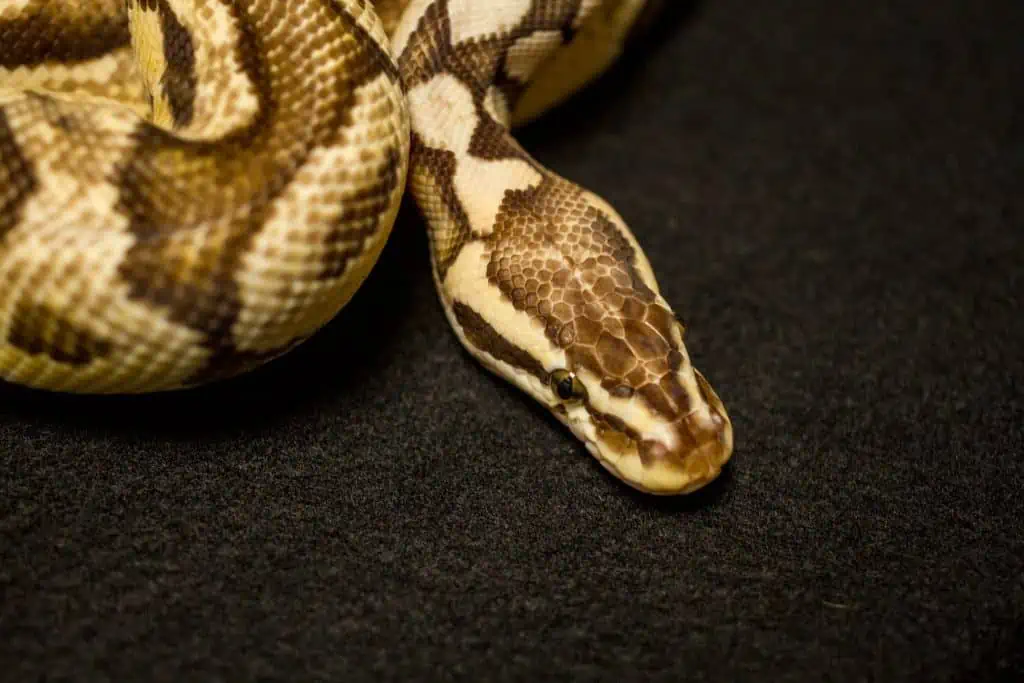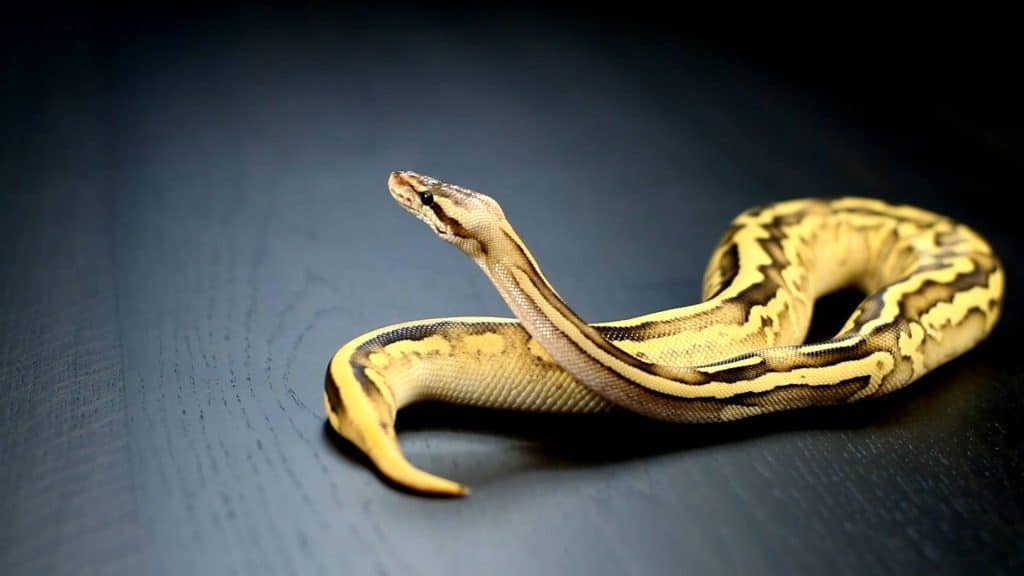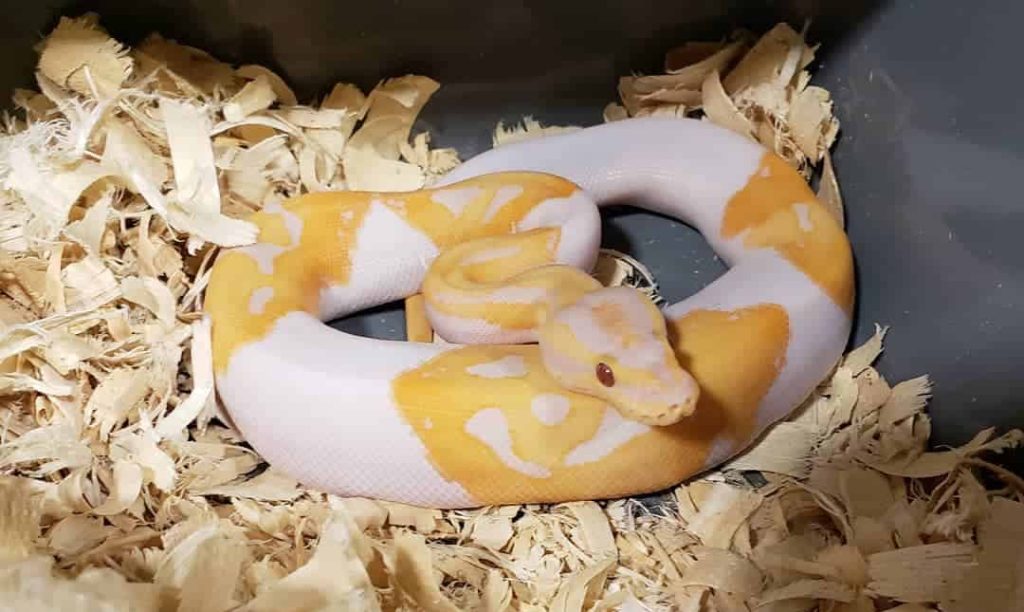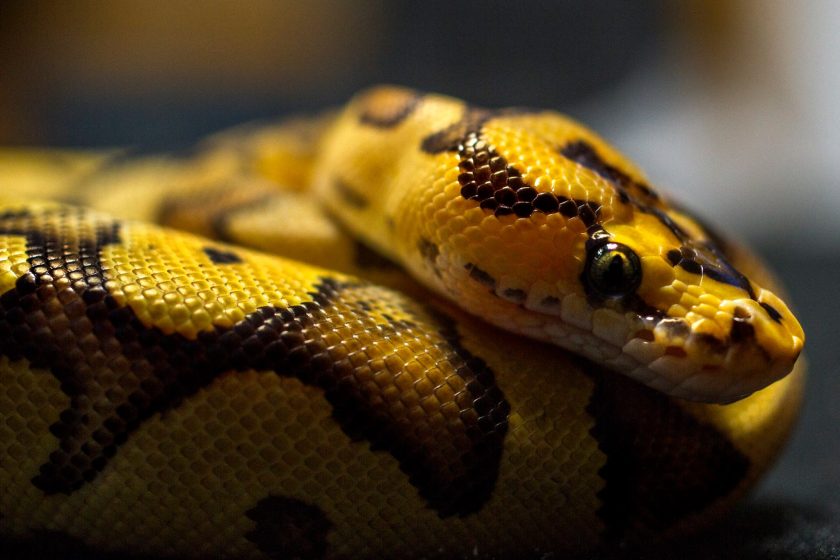Ball pythons are renowned for their diverse array of behaviors, including the often-overlooked activity of yawning. Although it may seem peculiar, this behavior is a significant part of your scaly friend’s communication and can give us an insight into its health and mental state.
Yawning in ball pythons may mean they’re fearful or hungry or stretching their muscles; however, in hotter climates, it could be linked to thermoregulation! In some cases, medical issues could be what’s triggering your ball python to yawn, such as:
- Respiratory problem
- Mouth rot
- Inclusion body disease
If your python keeps yawning frequently or you are noticing any other signs of illness, it is important to consult with a veterinarian.
In this article, we’ll explore the causes of ball python yawning and examine what to do if they keep yawning and when it’s necessary to seek veterinary advice.
What Is a Yawn Anyway?
Yawning in humans is an involuntary process in response to fatigue or tiredness, allowing us to fill our lungs with air completely. This process also acts as a radiator and cools down our brain by introducing cooler blood from the lungs and extremities to replace the hot blood. However, yawning or mouth gaping in snakes is a bit different and happens for a few reasons.

Is It Normal for a Ball Python To Yawn?
Yawning is a perfectly normal behavior for ball pythons, similar to humans. It’s usually seen before or after meals and when they’re winding down to sleep. However, noticing your snake frequently yawning without correlating to their sleeping and eating habits could indicate an underlying issue that warrants veterinary attention.
As such, keep a close eye on your pet’s yawning frequency so you can react quickly if something isn’t quite right with their health!
What Does It Mean When a Ball Python Yawns?
A yawn from a ball python could signal a variety of things. It’s important to note the context in which the ball python is yawning and its body language. Depending on the situation and your experience with your pet snake, you may interpret its body language differently. I think further investigating these explanations will give you a better understanding.
Regurgitation
Ball pythons may sometimes regurgitate their meals if they feel stressed after eating or when handled shortly afterward. Regurgitation is also a way for the serpent to expel indigestible material from its stomach. When this occurs, you’ll likely see your pet open its mouth wide—like we would with a yawn—for food and other substances within the stomach to be released, an event that’s not at all worrying but rather quite common among these species!
Smelling the Air
Your ball python uses its Jacobson’s organ to help them gain insight into its environment. Located on the roof of their mouth, this special sensory organ allows your snake to “taste” the air and use it to detect potential food sources or even a mate.
You may have noticed that sometimes when they flick out their tongue, they could also be opening up their mouth as if yawning – in reality, these are both signs that your ball python is taking in extra information from around them by using its Jacobson’s organ.
Adjustment of Jaws
The jaws of ball pythons are nothing short of remarkable due to their incredible elasticity, allowing the snake to swallow a variety of prey–including gerbils, mice, and rats–whole.
Here is where things get really interesting: rather than being connected by bone like other species, the lower jaw slides along ligaments and tendons that allow it to stretch wide enough for consumption.
This mechanism puts them ahead in terms of food control, enabling them to consume whatever they choose with ease and safely! In reality, what may appear to us as yawning in ball pythons is actually them stretching and relocating their jaws into a natural position.
Stretch Out Jaw Muscles
The ball python’s jaw muscles, tendons, and ligaments boast the same flexibility that a gymnast would possess. Occasionally, this snake needs to stretch out these elements in its jaw to improve blood flow throughout its body while also increasing strength and suppleness.
Stretch Out Its Body
Apart from yawning to extend its jaw, a ball python also stretches out and exercises the rest of its muscles after being sedentary for some time. Much like us humans, snakes need to stretch before beginning to move again; sitting or lying down for too long can cause their muscles to become tight and tense.
Thus, they may start with gaping and stretching before engaging in activity once more – just as we often do when waking up or after an extended period of stillness!
Getting Ready To Eat
Ball pythons regularly yawn prior to eating meals. This action enables your pet snake’s jaw to adjust itself so it can swallow its prey whole. Unlike mammals, reptiles such as pythons possess pliable skulls that enable them to consume food items heavier than their own body weight without chewing – however, more often than not, the meal will be no bigger than a third of its weight.
Breathing Issues
Consistent open-mouthed breathing could indicate that your ball python is unwell. If sickness has hindered their ability to breathe normally, they may resort to this form of respiration in order to make up for it. In the event you think something isn’t right with your snake, don’t hesitate; to get them to a vet as soon as possible!

Should You Do Anything if They Keep Yawning?
While yawning is sometimes a normal behavior in ball pythons, if the frequency of this activity seems to increase, it’s important to investigate why.
To ensure your pet snake is safe and contented, I’ve outlined some simple steps that you can take on this journey toward understanding.
Lookout for the Signs of Illness
If your ball python keeps yawning more than usual, take a moment to look for any signs of distress or illness. Your snake can’t tell you what’s wrong, so paying attention to all peculiar habits is essential. Stress and sickness may be hindering its breathing capabilities, causing fatigue-like behavior such as excessive yawning – if this is the case with yours, then tending to them quickly and correctly will help ensure their health!
Feed the Snake
Before you book an appointment with the vet, determine if your ball python needs a meal. Sometimes ball pythons yawn excessively because they’re hungry – just like us humans!
Make sure to provide them with enough food so that their yawns are not a result of hunger and prevent the need to wander in search of prey. When you keep your pet appropriately fed, there’ll be no more constant yawns!
Don’t Try Home Remedies
Although some ball python owners may attempt to treat their pet’s respiratory infection with a homemade remedy, such as steam infused with eucalyptus oil, this is unlikely to have any beneficial effect.
When faced with serious medical issues for your beloved pet, I always urge pet parents to consult and follow through on medication prescribed by an experienced veterinarian.
Analyze Its Environment
Prior to reaching out to a Python veterinarian, make sure you inspect the enclosure. Temperature is key; an environment that is too warm may cause your pet snake to yawn for body temperature regulation excessively – this isn’t ideal for their wellbeing.
Also, humidity should be monitored, with levels peaking around 60-70%. When it’s scorching outdoors, ball pythons find solace in moving under shades and rocks to cool off.
Thus, any enclosure designed for your pet must include a shady area and water access to maintain hydration.
Failure to properly meet these reptiles’ care requirements may make them anxious and result in excessive yawning.
When Should I Be Concerned?
While yawning in ball pythons is usually nothing to worry about, it’s important to be aware of any potential warning signs that may indicate a more serious underlying issue. Here I’ve outlined some behaviors you should look out for and pay special attention to.
Breathing Issues in Ball Pythons
If you notice your ball python breathing with its mouth open, this can indicate a respiratory issue. Respiratory illness is often the cause for increased “yawning” behavior due to difficulty in obtaining oxygen and clearing the nose. As such, yawning may become more frequent as they try desperately to breathe better.
A surefire way to detect if your ball python is facing a respiratory difficulty is by paying attention to any of the following indications:
- Wheezing sound while breathing
- Mucous on the tongue & in the mouth
- Nasal discharge
- Labored breathing
- Bubbles of saliva from the mouth
Commonly, respiratory infections are the result of improper husbandry conditions such as:
- Wrong temperature
- An unclean tank
- Incorrect humidity level
Respiratory issues should be treated as quickly as possible by a qualified veterinarian. Antibiotics are usually required for success, so make sure your snake is seen by the vet without delay.
Mouth Rot
Infectious stomatitis, more commonly known as mouth rot, is a typical bacterial infection that can be seen in reptiles. Bacteria often find their way into small cuts or wounds and then move throughout the body. A majority of cases are observed around the gums and mouth areas.
Snakes may exhibit indications of an occurrence such as excessive yawning, or they might continually rub their mouths against objects inside their enclosures like hides, water bowls, and decorations.
Examine your pet’s mouth for redness, swelling, sores, or ulcers – if any of these are present, take them to the vet as soon as possible.
Inclusion Body Disease
IBD is an infectious viral disease that can be passed from one snake to another and affects captive boa constrictors and pythons. If your ball python seems to yawn more frequently, IBD may very well cause it.
This disease causes muscular disfigurement and often leads to even further health complications, such as bacterial, fungal, or blood infections, which can severely harm the animal if left untreated.
Pets attacked by IBD can commonly exhibit the following symptoms:
- Difficulty breathing (leading to yawning)
- Lethargy
- Skin disease
- Stargazing or head lifting
- Swollen mouth
- Disorientation
- Refusal to eat
- Constipation
Unfortunately, inclusion body disease has no cure-of-the moment. Poor or unsanitary tank conditions can weaken your snake’s immunity and make them more vulnerable to catching this illness from other snakes – hence it is vital to take care of your ball python properly & keep their environment clean and away from any other potential carriers of the contagion!

Take Care!
Yawning in ball pythons is normal and may indicate a contented and relaxed snake. But if your snake appears to be yawning excessively for more than two days or seems distressed in any way, it may indicate an underlying health problem like respiratory illness, inclusion body disease, or mouth rot; then it’s best to have a vet take a look. Do not attempt to fix the issue on your own, as this could cause further harm to your pet.
Have you experienced excessive yawning with your ball python? How did you correct it? Please share your story in the comments below!


